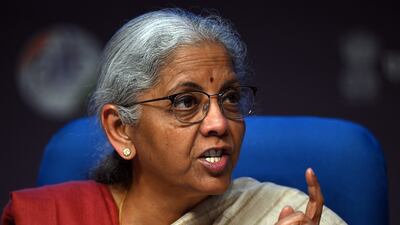India's latest budget includes a reduction in personal income taxes, a measure analysts believe will help to reverse sluggish consumer spending in the world’s fifth-largest economy.
The government announced a tax exemption for people earning up to 1.28 million rupees annually ($14,800), increasing the previous limit of 700,000 rupees. Tax rates were also lowered for those earning above this new threshold.
“Expectations are that this could provide a considerable consumption boost of 700 billion rupees, and it can be rightfully termed middle-class-friendly,” said Vijay Valecha, chief investment officer, Century Financial.







India's economic growth is forecast to slow down this year in the face of inflation and lower consumer spending.
Many companies operating in India, spanning sectors from cars to everyday consumer goods, have reported disappointing earnings in their most recent financial reports, mainly a result of a decline in domestic sales.
Some analysts have also pointed to deeper structural issues within the country’s economy, such as income inequality, unemployment, and the need for further reforms in various sectors.
India's economic survey has forecast gross domestic product growth of 6.3 per cent to 6.8 per cent for the next fiscal year starting April 1, compared with an expansion of 8.2 per cent last year.
“The new tax regime is simpler and easier to understand than the old one. This makes it easier for taxpayers to file their returns and comply with tax laws,” said VG Shaji, who runs a tax consultancy in the Indian state of Kerala.
The tax exemption is a “welcome relief” for India's middle class, but its overall effectiveness will depend on consumer and business choices, economic conditions, and other government policies, he added.
Budget deficit
The government will aim to lower its budget deficit to 4.4 per cent of GDP next fiscal year, down from the current year's 4.8 per cent, Indian Finance Minister Nirmala Sitharaman said on Saturday.
However, to fund the deficit, the government raised its gross market borrowing to 14.82 trillion rupees ($171.26 billion), up from 14.01 trillion rupees this year.
This sets the stage for potentially reducing the deficit even further to 3 per cent by fiscal year 2029, Mr Valecha said.
India’s fiscal deficit widened significantly during the Covid-19 pandemic as the government increased spending to address the crisis.
“The fiscal deficit of India, which had grown to astronomical levels during Covid, has been brought down gradually with minimal disruption, and the long-term road map seems achievable,” Mr Valecha said.
Implications for non-resident Indians
The budget emphasises stricter monitoring of income earned abroad by NRIs, which is likely to be achieved through enhanced data sharing agreements with other countries and stricter enforcement of existing tax laws.
However, the government also introduced some provisions aimed at incentivising expat participation in specific sectors.
Ms Sitharaman announced that NRIs providing services to Indian companies involved in setting up or running electronics manufacturing facilities will be eligible for presumptive taxation.
This means they can pay tax on a presumed percentage of their gross receipts from these services, rather than calculating their actual income after deducting expenses.
The government also raised the threshold for tax collected at source on remittances under the Liberalised Remittance Scheme (LRS) to 1 million rupees from 0.7 million rupees. The LRS allows Indian residents to send a certain amount of money abroad each year for various permitted purposes.
“[This] should benefit the travel and foreign exchange sectors,” said Poonam Upadhyay, director, Crisil Ratings.
“It will provide tailwinds for the outbound tourism and airline sector. Students and individuals seeking medical treatment will also benefit,” she added.



